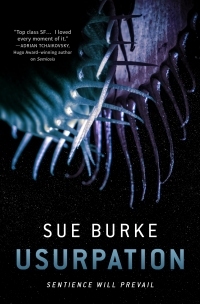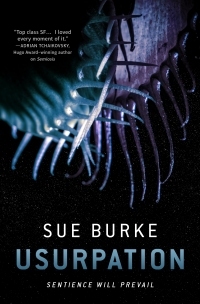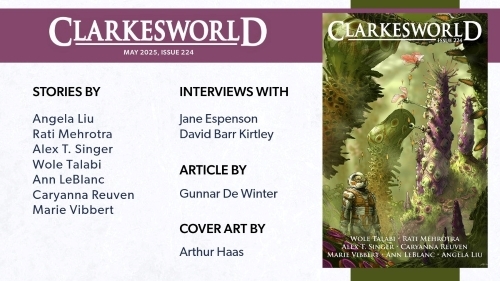Sue Burke's Blog, page 2
July 16, 2025
A birthday song

To celebrate my 70th birthday, my husband organized a big party. He and our friends and families made the evening memorable in many ways. Among the festivities, my brother-in-law Tom Finn sang a song, and soon everyone was joining in the chorus.
You can enjoy the performance here.
Sue’s song (Sung to the tune of “Paperback Writer” by The Beatles)
She spent her life doin’ all kinds of work
That wasn’t enough for Sue Burke
Reading books from cover to cover
Despite marrying my brother, she was gonna be a sci-fi writer
Sci-fi writer
Research, then, was so tough, you see
You had to go to a place called the “library”
But things were different in the modern age
She advanced a stage, finally ditching her typewriter
Sci-fi writer
Life in Milwaukee just seemed so lame
She spent some time in Austin, then went to Spain
Being a writer’s not a life of ease
Translated Amadís, but she needed something to ignite her
Sci-fi writer
Sci-fi writer!
Habla y escribe bien español
Pues hecho un refrán en castellano
Cervantes sí mismo la certificó
Ya no es solamente una traductora
¡Es autora!
She taught us what happens when you take a chance
On a distant world with sentient plants
And Glassmakers interfere to see you through
You can’t lose with rainbow bamboo who’s quite a fighter
Sci-fi writer
And we’re really hoping that she sells the rights
To usurp a million dollars overnight
After seventy years, she has proved she can write
And for seventy more, she’ll delight us as a sci-fi writer
Sci-fi writer
Sci-fi writer!
July 14, 2025
‘Usurpation’ pre-order sale at Indigo

Indigo, Canada’s biggest bookstore, is running an online 25% off sale from July 14 to 20 for its Most Anticipated Science Fiction. This includes the pre-orders for the paperback edition of Usurpation.
While you’re there, check out the many outstanding Canadian authors. Here’s the 2025 Aurora Awards ballot, if you need a suggestion.
July 8, 2025
B&N preorder sale – buy the upcoming paperback edition of ‘Usurpation’

Barnes & Noble is holding a promotion for pre-ordered print books from Tuesday, July 8, to Friday, July 11. Prices are 25% off Premium and Rewards members. Use the code PREORDER25
The trade paperback of Usurpation will be released on October 21, 2025. If you haven’t read it yet, this is your chance to get a good price — and to buy more books from your other favorite authors!
June 13, 2025
What was that hallucination?

When I was 10 years old, before a measles vaccination had been developed, the adults knew an epidemic was coming, and sure enough, I got sick, very sick.
Among my many bad memories of measles was waking up one night in a pool of vomit while hallucinating from a high fever. I remember my mother coming to clean me up, and as she cleaned up the bed, I sat on a bench in the corner of my room.
While I waited, Snagglepuss, a cartoon character I liked, a pink lion, came to sit and talk with me. He was comforting, calming, even a little funny, and he genuinely made me feel better and feel safe.
A few days later, as I thought about it, I appreciated Snagglepuss talking so soothingly to me when I really needed comfort, but the whole thing was obviously a hallucination. (I had other, very unpleasant hallucinations that night, too.) What puzzled me was the way I had imagined his personality, very unlike the TV persona. Normally he was a smart-aleck, even.
Much, much later, I realized that yes, I had been hallucinating, but not the way I thought. Through my mental haze, I hadn’t recognized the kind person providing such gentle, loving care, but in retrospect I could distinctly identify his personality. He had been my father.
 Dad in his college days.
Dad in his college days.
May 28, 2025
A Few Varieties and Secrets of Drafts and Outlines
Fiction writers have an ongoing debate about whether or not to plot: that is, whether to use an outline. But outlines and drafts come in many varieties, which complicates the debate. Here’s everything I know about outlines and drafts condensed into handy bullet points (itself a kind of outline), which I hope will be helpful to you.
Why outline?
• Ideas for novels are too big to hold in your head all at once; you need some sort of notes.
• You might be able to write faster using an outline.
• Outlines can let you write less anxiously because you know what will happen next.
• Outlines are a “big picture” tool to help you revise/re-envision your story for subsequent drafts.
• Leonardo da Vinci used outlines when he painted; this is a respectable artistic tool.
Why avoid outlines?
• Your brain simply doesn’t work that way; you can do just fine without one.
• You lack experience using this tool, so it’s hard to figure out and feels uncomfortable.
A few kinds of outlines
• Three-act structure
• Save the Cat formula
• Romance novel formula
• Scrivener or other software
• 3 x 5 cards or Post-It Notes
• Pictures/scrapbook/artwork/poems
• Spreadsheets/charts/maps
• Hero’s Journey
• Heroine’s Journey
• Fool’s Journey
• Beat Sheets
• Snowflake method
• East Asian four-act kishōtenketsu
• Detailed scene-by-scene
• General chapter-by-chapter
• Character driven
• Theme or narrative focused
• Crisis or paradox centered
• A series of questions
• A series of causes and effects
• Continuous re-evaluation
• Joyous amalgam of all these
Some secrets to using an outline as a writing tool
• You can make an outline at any time: before, during, or after any draft or part of a draft.
• Your outline can be a simple list of beats, plot twists, or key scenes.
• The plot outline is not the manuscript outline, which might not be chronological or logical.
• There is no Platonic ideal story; a story can take different forks in the road along the way.
• You can begin plotting from the end, middle, or beginning of the story.
• Any single step or couple of steps of a standard plot outline can be a short story.
Kinds of drafts
• Zero draft, a wildly experimental initial draft that doesn’t “count” as a first draft.
• Dialog-only draft, with the rest to be filled in during subsequent drafts.
• Disconnected scenes, to be connected in a later draft.
• Fast drafting, writing as quickly as possible without looking back, NaNoWriMo-style.
• Writing each scene as a short story.
• Messy, ugly, crappy early drafts; only the final draft needs to be beautiful.
Exercise: a tiny outline
Summarize your story in three three-word sentences. Such as, for a romance: 1. Girl meets boy. 2. Girl loses boy. 3. Girl wins boy. Or for Hamlet: 1. Hamlet has doubts. 2. Doubts are resolved. 3. Hamlet gets revenge. Does your story have a beginning, middle, and end?
(This post is available as a one-page PDF here.)
May 21, 2025
My vote for the Nebula Award for Novella

As a member of SFWA, the Science Fiction and Fantasy Association, I get to vote on the Nebula Awards. Here’s my vote for best novella (17,500 to 40,000 words). The awards will be presented at the Nebula Conference on June 7 in Kansas City.
The Butcher of the Forest by Premee Mohamed (Tordotcom) — A woman ventures into a dangerous forest to save two children from a monster. A grim story told with urgency.
The Tusks of Extinction by Ray Nayler (Tordotcom) — Elephants and newly-revived mammoths face extinction from ivory poachers, but they have protectors. The story explores its ideas back and forth in time to dramatize a contest between greed and survival.
Lost Ark Dreaming by Suyi Davies Okungbowa (Tordotcom) — An ancient power arises in a post-apocalypse dystopia, and three very different people in a literally stratified society must try to survive.
Countess by Suzan Palumbo (ECW) — A story inspired by The Count of Monte Cristo, but in space.
The Practice, the Horizon, and the Chain by Sofia Samatar (Tordotcom) — The chain is about an ex-slave, the practice is about the chance to become something better, and the horizon the chance to get it. A lot of social justice, told with the distance of spaceships.
My vote: The Dragonfly Gambit by A.D. Sui (Neon Hemlock) — A former lover, now an enemy, conspires to bring down an empire. I was impressed by the tight storytelling, emotional tension, and frequent reversals.
May 14, 2025
My vote for the Nebula Award for Novelette

As a member of the Science Fiction and Fantasy Association, I get to vote for the Nebula Awards. Here is my vote in the category of novelette (7,500 to 17,500 words). The award will be presented at the Nebula Conference on June 7 in Kansas City.
Overall, the stories amounted to a satisfying little anthology. I based my vote on the strength of the storytelling, not an easy metric to apply since they’re all good, but I thought one in particular was slightly better. Of course, your opinion may differ.
“Negative Scholarship on the Fifth State of Being” by A.W. Prihandita (Clarkesworld 11/24) — A doctor finds herself limited by bureaucracy when an unusual alien comes seeking her care. Your heartstrings will be tugged.
“Loneliness Universe” by Eugenia Triantafyllou (Uncanny 5-6/24) — Friends try to meet, but they can’t find each other even though they’re in the same place. Then things get more eerie (no spoilers). Not quite horror but very unsettling.
“Katya Vasilievna and the Second Drowning of Baba Rechka” by Christine Hanolsy (Beneath Ceaseless Skies 4/18/24) — Romantasy, sweet and fulfilling. All fairy tales (or rather, tales about vengeful river spirits) should be like this.
“The Brotherhood of Montague St. Video” by Thomas Ha (Clarkesworld 5/24) — The accidental discovery of a book printed on paper triggers an existential crisis in an electronic world with constant volatility. The understated storytelling style effectively delivers growing horror.
“What Any Dead Thing Wants” by Aimee Ogden (Psychopomp 2/24) — Terraforming by magic leaves behind ghosts that want something. The cool, deadpan narration makes the fantastic feel real, but the magic system seems inconsistent to me.
“Joanna’s Bodies” by Eugenia Triantafyllou (Psychopomp 7/1/24) — A teenage girl finds a supernatural means to bring a dead friend back. Although this is an obviously bad idea, it’s made worse by resentment, manipulation, immaturity, and guilt. Told with a gripping voice.
My vote: “Another Girl Under the Iron Bell” by Angela Liu (Uncanny 9-10/24) — A demon will do anything to get freedom from an evil master. Which one, the demon or the master, is the most evil? Which one is in love? Every word is measured and every detail impeccable.
May 7, 2025
My vote for the Nebula Award for Short Story

Each year, the members of the Science Fiction and Fantasy Writers Association choose the winners of the Nebula Awards in seven categories, including short story (fewer than 7500 words). As a member, I can vote for the one I consider most deserving. Voting is closed, and the awards will be presented on June 7.
All these short stories are high quality and worthy of nomination, so your choice may very reasonably differ from mine:
“The Witch Trap” by Jennifer Hudak (Lady Churchill’s Rosebud Wristlet 9/24) — An old charm against witches inspires a reconsideration of the way that the fear of witches creates witches. Reconsideration, the story makes clear, might not be a bad thing.
“Five Views of the Planet Tartarus” by Rachael K. Jones (Lightspeed 1/24) — Flash fiction about horrors faced by those found guilty of treason, with an ennobling, subversive twist.
“Evan: A Remainder” by Jordan Kurella (Reactor 1/31/24) — A man who recently transitioned slowly comes to terms with his new identity. This involves coughing up a new skeleton (this is not a spoiler). Although it is tender, beautiful, and heartfelt, I think it’s literary fiction because the “magic” is wholly symbolic, not science fiction or fantasy — you may reasonably disagree, of course. While the lines between genres are always permeable and debatable, I think the Nebulas ought to stick to actual SFF. Literary writing has its own awards.
“The V*mpire” by PH Lee (Reactor 10/23/24) — A vulnerable adolescent on Tumbler gets bullied into letting monsters into his home. This story may be more metaphor than actual fantasy, but it’s brilliantly written, and the toxic manipulation involved is heartbreaking to witness.
“We Will Teach You How to Read | We Will Teach You How to Read” by Caroline M. Yoachim (Lightspeed 5/24) — A message is sent apparently to humans from a very different, brief-lived species: a simple message that holds entire lives. The story is told in a successfully experimental format, and it left me with a lot to think about.
My vote: “Why Don’t We Just Kill the Kid in the Omelas Hole” by Isabel J. Kim (Clarkesworld 2/24) — I nominated this for the strength of the storytelling voice, and after reading all the finalists I still like it best: “… tell me there is a better solution than putting one single kid in the hole, and letting that one single kid have a miserable life, in return for the good lives of all of our children?” Moral certainty is so messy, but at least the kid in the hole can be ethically sourced.
May 1, 2025
Short story translation at Clarkesworld: ‘Proxima One’

My translation from Spanish of the short story “Proxima One” by Caryanna Reuven has just been published by Clarkesworld Science Fiction and Fantasy Magazine! Read it here. A machine intelligence called Proxima One sends probes into the galaxy to search for intelligent life, and the probes must cope with the surprising things they discover.
***
What happens at a science fiction convention? I’ve written a report about the most recent Windycon, a Chicago regional convention. It’s the longest-running convention in the area, now in its 50th year. About 1000 people attended, and it fell like a busy but relaxed weekend with friends and family. Read it here at the Science Fact & Science Fiction Concatenation website.
April 24, 2025
My Goodreads review of ‘Speculative Whiteness: Science Fiction and the Alt-Right’

Speculative Whiteness: Science Fiction and the Alt-Right by Jordan S. Carroll
My rating: 4 of 5 stars
I read this short book before it became a finalist for a Hugo Award for Best Related Work, and it’s a timely choice that deserves the attention the nomination brings.
The author, Jordon S. Carroll, discusses the ways that alt-right/fascist/White nationalists have long used popular culture to promote their ideas, including science fiction, fantasy kingdoms, and superheroes. Alt-right readers, he says, are willing to convince themselves that the future in science fiction is a blueprint for their hopes. This explains their objections to Lt. Uhuru in Star Trek. Black people don’t belong in their future.
Speculative Whiteness shows how these ideas really belong to the past, and how alt-right expectations are self-contradictory in any case. The book includes copious footnotes and ends on a hopeful note: “the alt-right promises a bold new future in space but it never achieves escape velocity from white supremacy’s perpetual present.”
However, the book was published in October 2024, and a lot has happened since then. The alt-right won the US presidential election and many other political offices, and our present seems to be slouching toward a future that only the alt-right wanted.
Here are some articles that extend the focus of the book into the present:
Interview with Jordan S. Carroll – Exploration Log 7: Science Fiction and Other Suspect Ruminations
https://sciencefictionruminations.com…
China Miéville says we shouldn’t blame science fiction for its bad readers – TechCrunch
https://techcrunch.com/2025/03/30/aut…
We’re sorry we created the Torment Nexus – Charlie Stross’s Diary
https://www.antipope.org/charlie/blog…
How Trump and Musk Are Ruining Sci-Fi – Daniel W. Drezner on Substack
https://danieldrezner.substack.com/p/…
The big idea: will sci-fi end up destroying the world? – The Guardian
https://www.theguardian.com/books/202…



